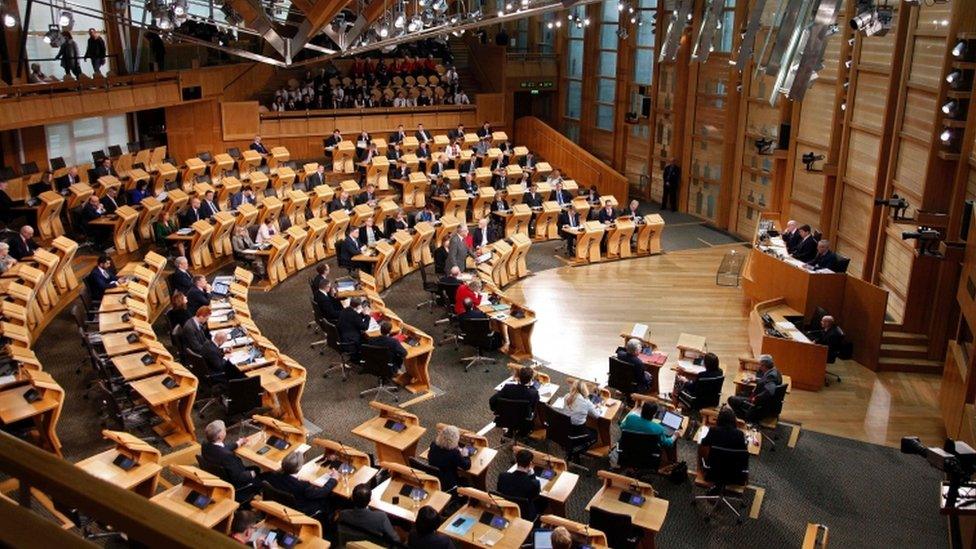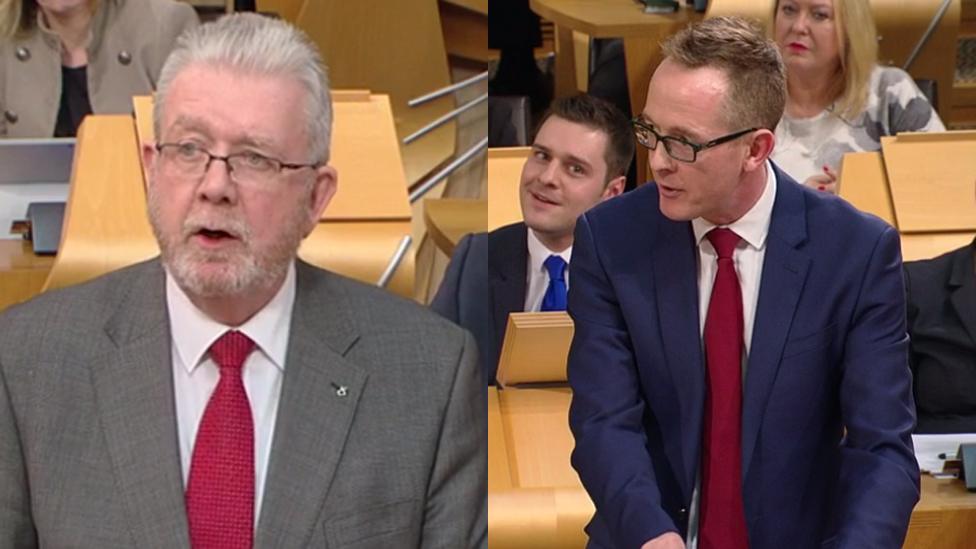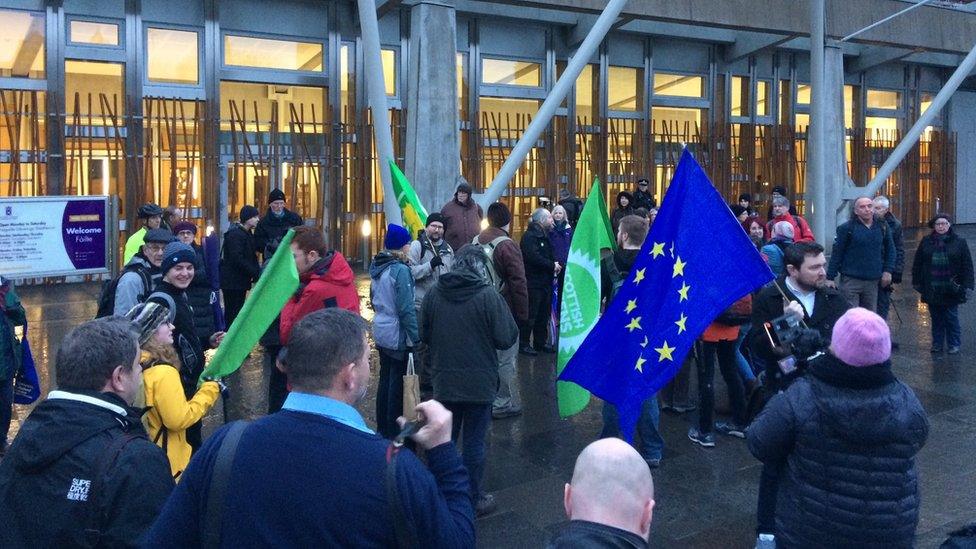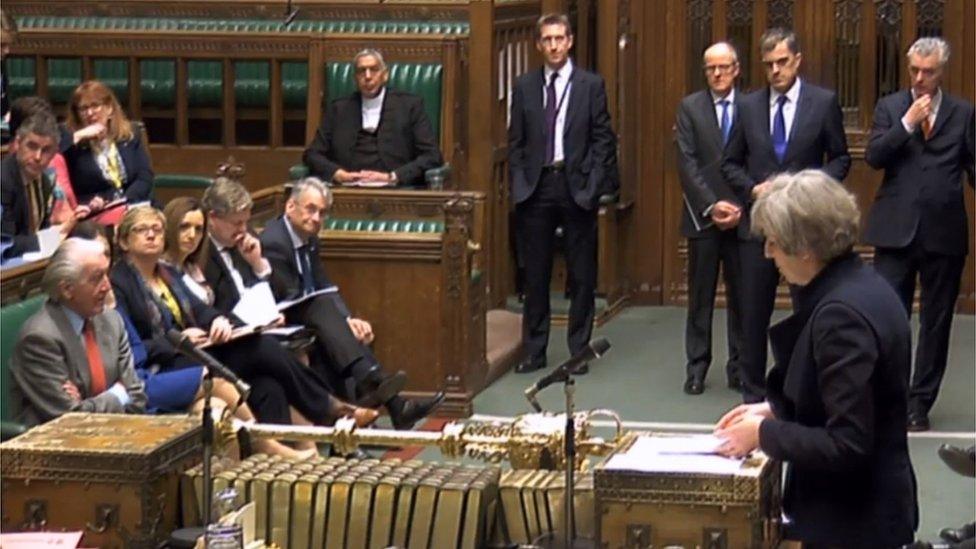Holyrood votes against triggering Brexit
- Published

A majority of MSPs opposed the UK government triggering Article 50, but the vote was largely symbolic
The Scottish Parliament has voted by 90 to 34 to oppose the UK government starting the Brexit process.
The Supreme Court ruled last month that there was no legal need for Holyrood to give its consent to the triggering of Article 50.
But First Minister Nicola Sturgeon said she would let MSPs have a say, despite it being largely symbolic.
Ms Sturgeon predicted the vote would be one of the most significant in the Scottish Parliament since devolution.
The SNP tried to block the UK government's Brexit bill last week.
Only one of Scotland's 59 MPs - Scottish Secretary David Mundell - supported the bill, but it ultimately passed its first parliamentary hurdle by 498 votes to 114.
Agreed UK position
The European Union (Notification of Withdrawal) Bill returned to the Commons on Monday, when MPs began detailed scrutiny of the legislation.
MSPs voted to back a Scottish government motion in the Scottish Parliament stating that the bill should not proceed.
The SNP, Greens, Liberal Democrats and most Labour MSPs supported the motion, with three Labour MSPs - Neil Findlay, Elaine Smith and Richard Leonard - defying the party whip and opposing it alongside the Conservatives.
The motion, lodged by Brexit minister Michael Russell, said the UK government had failed to properly consult the devolved administrations on an agreed UK position on Brexit.
It also said the government had refused to give a guarantee on the position of EU nationals in the UK, and had failed to answer a range of questions regarding the full implications of withdrawal from the single market.
A Green amendment, stating that the decision to proceed with the Brexit bill does not respect the majority vote to remain part of the EU that was returned in every council area in Scotland, was backed by 72 votes to 33 with 18 abstentions.
Mr Russell opened what was to become a heated debate by saying Scotland had voted "clearly and decisively" to remain in the EU in last year's referendum.

Mr Russell said Scotland had been ignored by the UK government - but Mr Lamont accused the Scottish government of "grievance politics"
He said the Holyrood vote would allow MSPs to "say to the UK, to Europe and to the world that we oppose the catastrophic hard Brexit now being pursued by the Tories at Westminster."
Mr Russell added: "This vote is more than symbolic. It is a key test of whether Scotland's voice is being listened to, and whether our wishes can be accommodated within the UK process."
'Offered nothing'
He insisted that the Scottish government had worked "long and hard" to deliver compromise proposals, which he said would have allowed Scotland to stay in the single market even in the rest of the UK leaves.
But he said: "So far, the UK government has not offered a single compromise of its own. In fact, it has offered nothing. Neither formal reaction to our proposals, nor formal rejection of them."
Mr Russell went on to describe the Holyrood debate as being "about democracy itself", adding: "It's a debate about the sort of country the UK is becoming and the sort of country we in Scotland wish to be. And the contrast between those countries is stark."

Green activists staged a rally outside Holyrood as the debate continued inside
John Lamont of the Scottish Conservatives claimed the Scottish government's default position was to "try to manufacture a grievance out of nothing".
He said: "The Scottish government try to portray the Supreme Court ruling and the UK government's bill to trigger Article 50 as an example of Scotland being ignored.
"The truth is actually more simple. It is a matter for Scotland's other parliament to deal with and it is, as a reserved matter, one for Scotland's MPs to scrutinise."
He added: "This is how the devolution settlement works, and it is time that the SNP accepted this principle and moved on from grievance politics.
"Despite the rhetoric from the Scottish government, the reality is that they are being given plenty of opportunity to engage in the process of the UK leaving the EU."
'Unanswered questions'
Scottish Labour said it would vote against triggering Article 50 - although three of its MSPs defied that instruction - but tabled an amendment calling on the SNP not to use Brexit as an excuse for a second independence referendum.
The move put Scottish Labour leader Kezia Dugdale at odds with UK Labour leader Jeremy Corbyn, who is facing a revolt by pro-Remain MPs - including the party's only Scottish MP Ian Murray - who are defying his leadership to vote against the Brexit bill at Westminster.
Ms Dugdale told the Holyrood debate that Brexit and independence were "two sides of the same coin", adding: "The only thing worse than Brexit for Scottish jobs and the economy would be independence.
"Our nation is divided enough. Another referendum would do irreparable damage to the very fabric of communities across Scotland.
"But the reality is that the SNP has only been given the excuse to seek another referendum because of the mess the Conservatives have made of this whole process".

The prime minister has urged MPs to respect the outcome of the EU referendum and last week's parliamentary vote on the Brexit bill
The Scottish Greens staged a "Scotland says stay" rally outside Holyrood to mark the debate.
The party's MSP Ross Greer said the Article 50 bill was "wildly inadequate" and claimed the Scottish government's attempts at compromise had been met by little but "empty rhetoric" from the UK government,
Scottish Liberal Democrat leader Willie Rennie went on the attack by saying the SNP was obsessed with independence, while the Tories were dividing the country with Brexit and Labour was in "total and utter confusion".
A UK government spokesman said Holyrood was free to debate any issue it chooses, and that it would "continue our engagement with the Scottish government and with people and groups across Scotland as we prepare to leave the EU to secure the best deal for Scotland and the UK."
Speaking in the Commons on Monday, Prime Minister Theresa May warned MPs not to "obstruct" the will of UK voters by changing the Brexit bill.
She said: "The message is clear to all - this House has spoken and now is not the time to obstruct the democratically expressed wishes of the British people.
"It is time to get on with leaving the European Union and building an independent, self-governing, global Britain."